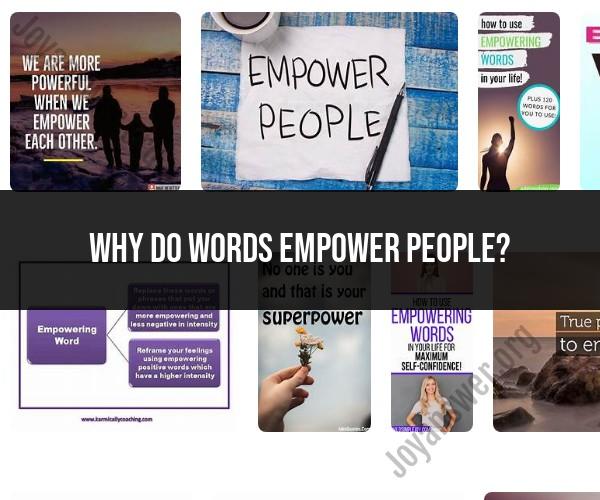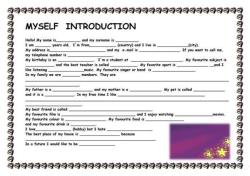Why do words empower people?
Words have the power to empower people for several reasons:
Communication and Connection: Words are the primary means of communication between individuals and communities. They allow people to convey their thoughts, feelings, and ideas to others, fostering a sense of connection and understanding. When people are heard and understood, they often feel empowered and validated.
Expression of Identity: Words enable individuals to express their identities, values, and beliefs. When people can articulate who they are and what they stand for, it can strengthen their sense of self-worth and empower them to advocate for their interests.
Education and Knowledge: Words are the building blocks of education and knowledge. Access to language and literacy empowers individuals to acquire information, learn new skills, and make informed decisions. Education, driven by words, can open doors to opportunities and personal growth.
Advocacy and Activism: Words are a powerful tool for advocacy and activism. When individuals use words to raise awareness about important issues, express dissent, or advocate for change, they can mobilize support, challenge the status quo, and drive positive societal transformations.
Inspiration and Motivation: Words can inspire and motivate people to overcome challenges, pursue their goals, and persevere in the face of adversity. Inspirational speeches, quotes, and writings often ignite a sense of determination and empowerment.
Empathy and Support: Words have the capacity to convey empathy and support. When people receive words of encouragement, understanding, and empathy from others, they feel valued and empowered to face life's difficulties.
Affirmation and Positive Self-Talk: The way individuals speak to themselves, their inner dialogue, plays a crucial role in self-esteem and self-empowerment. Positive self-talk and affirmations can boost self-confidence and resilience.
Legal and Human Rights: Words are fundamental to the establishment and protection of legal and human rights. Declarations, constitutions, and laws are written in words, and they serve as a foundation for ensuring individuals' rights and freedoms.
Creativity and Artistic Expression: Words are at the heart of artistic expression through literature, poetry, music, and other forms of creative writing. Artists and writers use words to convey emotions, challenge norms, and provoke thought, often inspiring others in the process.
Problem-Solving and Innovation: Words are essential for discussing complex problems, collaborating with others, and generating innovative solutions. Effective communication through words can empower individuals and teams to tackle challenges and drive progress.
Personal Agency: When individuals use words to make choices, set goals, and express their intentions, they assert their personal agency and autonomy. This sense of control over one's life can be highly empowering.
In summary, words empower people by serving as tools for communication, self-expression, education, advocacy, inspiration, empathy, affirmation, and more. They are not only a means of conveying information but also a source of influence, connection, and personal growth. The ability to use words effectively and thoughtfully can have a profound impact on an individual's sense of empowerment and their ability to effect positive change in their own lives and in society.
The Empowering Nature of Words: How Language Shapes Beliefs and Actions
Words have the power to shape our beliefs and actions in profound ways. They can motivate and inspire us, or they can tear us down and discourage us. The words we use to talk to ourselves and others can have a significant impact on our confidence, self-esteem, and overall well-being.
One way that words can empower us is by helping us to develop a positive self-image. When we hear positive words about ourselves, we start to believe them. This can lead to increased confidence and motivation. For example, if we are told that we are intelligent, capable, and worthy of love and respect, we are more likely to feel good about ourselves and pursue our goals.
Words can also empower us by helping us to connect with others. When we share our thoughts and feelings with others, we feel less alone and more understood. This can help us to build strong relationships and feel supported. For example, if we are struggling with a difficult situation, talking to a friend or loved one can help us to feel better and come up with solutions.
Finally, words can empower us by helping us to make a difference in the world. When we speak out about what we believe in and use our voices to advocate for others, we can make a positive impact on the world around us. For example, if we are passionate about social justice, we can use our words to speak out against injustice and inequality.
Harnessing the Power of Language: How Words Can Motivate and Inspire
We can harness the power of language to motivate and inspire ourselves and others in a number of ways. Here are a few tips:
- Use positive language. When we talk to ourselves and others, we should use positive language. This means avoiding negative words and phrases, such as "I can't," "I'm not good enough," and "I'll never be able to do that." Instead, we should focus on using positive language, such as "I can," "I'm capable," and "I'm willing to try."
- Set specific and achievable goals. When we have specific and achievable goals in mind, we are more likely to stay motivated and focused. We can use words to help us set and achieve our goals. For example, we can write down our goals and create a plan for how we will achieve them. We can also use words to break down our goals into smaller, more manageable steps.
- Celebrate our successes. When we achieve our goals, we should take the time to celebrate our successes. This will help us to stay motivated and keep moving forward. We can use words to celebrate our successes, such as saying to ourselves, "I did it!" or "I'm so proud of myself!"
- Encourage others. We can use words to encourage and support others. When we tell others that we believe in them and that they are capable of great things, we can help them to reach their full potential. For example, we can say to a friend who is struggling with a difficult situation, "I know you can do this!" or "I'm here for you every step of the way."
The Psychology of Empowerment: Exploring the Connection Between Words and Confidence
There is a strong connection between words and confidence. The words we use to talk to ourselves and others can have a significant impact on our confidence levels.
When we use positive and empowering language, we are more likely to feel confident. This is because positive language helps us to focus on our strengths and abilities. It also helps us to believe in ourselves and our ability to achieve our goals.
On the other hand, when we use negative and self-defeating language, we are more likely to feel unconfident. This is because negative language focuses on our weaknesses and limitations. It also makes us doubt ourselves and our ability to succeed.
If you want to improve your confidence, it is important to be mindful of the words you use. Focus on using positive and empowering language, and avoid negative self-talk.
Conclusion
Words have the power to empower us in many ways. They can help us to develop a positive self-image, connect with others, and make a difference in the world. We can harness the power of language to motivate and inspire ourselves and others by using positive language, setting specific and achievable goals, celebrating our successes, and encouraging others. There is a strong connection between words and confidence. When we use positive and empowering language, we are more likely to feel confident and achieve our goals.













